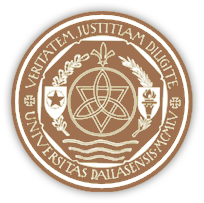At the end of Dr. de Alvarez’s Acknowledgements to his translation of Machiavelli’s The Prince, he writes
Finally, I wish to thank the students of my classes and seminars at the University of Dallas, in Rome and Irving, on whom this translation was first tested, and whose questions and comments sharpened my study and understanding of The Prince1.
This first issue of Symposium is a humble effort of de Alvarez’s students to return the thanks to a professor who dedicated his life to sharpening the study and understanding of his students.
The idea of Symposium editions of Ramify grew out of the ethos of the Braniff Graduate School itself, and the nature of the Institute for Philosophic Studies’ core curriculum. Through the core curriculum, the Braniff Graduate School attempts to foster an ongoing conversation with the authors of the great books, across disciplinary lines, among its students and faculty. Students from each discipline have the unique opportunity to explore the fundamental questions of the Western tradition with faculty from other disciplines, and thus the community of graduate students at the University of Dallas becomes a close community, diverse in thought, exploring the past in a unique and serious way. Like the graduate program itself, Ramify endeavors “to foster the involvement of scholars, teachers, and students in the ongoing dialogue within the Western tradition.”2 But each issue of Symposium, rather than merely exploring the questions probed in the core courses themselves, endeavors to pay homage to the thought of one of the professors who taught in the IPS program while also delving into the important questions raised by that professor throughout his published scholarship and lectures at the University of Dallas.
The thought of Leo Paul de Alvarez was a natural choice for the first issue of Symposium, as Dr. de Alvarez’s reflections swelled beyond disciplinary lines. Although Dr. de Alvarez taught in the politics department and wrote most prolifically on Machiavelli, he addressed political questions through courses on The Bible, Shakespeare, Aristotle’s Ethics, and the histories of Herodotus and Plutarch.3 Dr. de Alvarez understood that any serious study of politics arose out of a serious study of the human being, thus his thought should grip students of philosophy, literature, and politics: those who are interested primarily in understanding what it means to be a good man and a citizen.
This issue of Symposium begins with Aristotle, as any study of the regime and of man should. It is particularly fitting that John Peterson’s essay begins with Aristotle’s understanding of imperialism, the focus of Dr. de Alvarez’s dissertation and the beginning of his career as a professor of politics.4 When Peterson discusses self-sufficiency (autarkês) in Aristotle he explains that “(self-sufficiency) does not mean that one is alone and has no need of others, but that one has everything one needs in order to do the proper work of a human being well, and thus to achieve the human good.” In other words, Peterson sets forth a series of essential political questions that occupied Dr. de Alvarez as a scholar and a teacher, and that should occupy us: what does it mean to be a political animal? What is the good of political activity? And in what way are we reliant on other human beings if we are political by nature? If we are in some essential way connected to those in our own regime, in what sense are we connected with those outside of our regime? These questions lead to the climax of Peterson’s piece, and one of the primary tensions of political life itself: that “politics cannot be philosophical, but it must be.” Peterson’s essay is important because it addresses the myopic question of politics (how can one regime justly interact with another regime?) and the fundamental question of politics (how can the individual citizen, or philosopher, interact with his own regime?).
Next we feature an essay written by Christopher J. Wolfe. Wolfe considers one of the niche questions that arise out of Aristotle’s moral and political philosophy, but one that is no less important for understanding the man and the city. Wolfe’s question is “which Aristotelian virtue is architectonic for the good life, and for citizenship?” Wolfe points to de Alvarez’s mode of interpreting the virtue of magnanimity as a virtue that stands in relation to all the rest but is reliant on the possession of all the others. Wolfe’s piece is important because, moving forward from Peterson’s piece which considers the way in which the citizen participates in the polis, he considers what kind of citizen ought to rule in the polis.
Following Wolfe’s essay is one written by Bill Nunnally. Nunnally reflects on de Alvarez’s essay published in Ramify years ago on Herodotus and compares de Alvarez’s reading to Seth Benardete’s. The fundamental question raised by Nunnally, de Alvarez, and Benardete considers the difference between Eastern and Western regimes, a fundamental question lurking in the background of both Peterson's and Wolfe’s pieces. De Alvarez contends that Herodotus’s reading spells out poetry as the fundamental difference between the Greeks and the Persians, but Nunnally wonders if the difference that arises out of Herodotus is due less to an accurate historical depiction, and more due to poetic liberty seized by the historian Herodotus.
Moving forward from Nunnally’s essay we share two pieces on de Alvarez’s reading of Machiavelli. Michael Anton writes the first piece and hopes to clarify the Machiavellian Enterprise, and its proposed structure for the Prince and the Discourses. Taken in conjunction with Nunnally’s piece one wonders “is Machiavelli taking the same poetic liberties with history as Herodotus?” Anton’s close reading of Machiavelli allows him to expose some of the important turns taken by Machiavelli’s retelling of history, and the political implications of that retelling. Anton credits de Alvarez’s commentary on Machiavelli with unravelling some of the historical threads to reach the philosophical. He thus reasons that the style of commentary is itself “at its peak a philosophic work in its own right.”
Following Anton’s essay on de Alvarez’s contribution to the Machiavellian project is Kevin Slack’s essay on Machiavelli and Venice. With Slack’s piece we return to some of the Aristotelian themes from our first two essays, and we see de Alvarez’s Machiavelli in conversation with Aristotle. Slack’s study of Machiavelli’s Venice shows the subtle (but fundamental) ways in which Machiavelli departs from Aristotle’s understanding of the best regime. Slack’s close reading of Machiavelli goes to show the ways in which Machiavelli undermines ancient political philosophy and proposes a new model for the best regime.
Jerome Foss then considers de Alvarez’s interpretation of Shakespeare’s Timon of Athens. Alongside Shakespeare’s Timon, de Alvarez considers the fundamental political question first addressed by Peterson’s piece: the relationship between the man and the city, and the way in which the citizen is in some essential way dependent on other men. Following de Alvarez, Foss shows that Shakespeare’s Timon ought not merely be considered an unfinished and elementary play written by the younger Shakespeare, but reasons that the early play proposes important questions about the founding of the regime and the way in which the beginnings of the city influence the political life of its citizens (a question that is fundamental to both Machiavelli and Aristotle).
After Foss’s essay I turn to de Alvarez and American politics. What struck (and impressed) me through my reading of de Alvarez’s work, and my conversations with other students about de Alvarez as teacher, is the way in which de Alvarez’s musings on the ancients led him to consider the American regime in a serious way. With Lincoln, de Alvarez considers the perennial problem of the American regime: “In what way can reflection and choice be made possible among a free, numerous, and diverse people, who seem to be led by passion rather than reason?” De Alvarez follows Lincoln in considering the role of the statesman in fostering reflection and choice in a numerous and heterogenous republic and spells out the ways in which the wise man may persuade his fellow citizens to choose to live well. Ultimately, through his study of Lincoln, de Alvarez hopes to provide a new birth of political philosophy (for modern liberal regimes), alongside Lincoln’s “new birth of freedom” rooted in equality. De Alvarez’s study of Lincoln subtly points that Lincoln’s philosophy of equality is undergirded by some principle: that principle is to be found in Lincoln’s political religion.
Organizing the first issue of Symposium has been a great joy. I am indebted to my colleagues at Ramify and the contributors to the first edition. The quality of scholarship contained in this volume is first rate and has exceeded my expectations for the journal—I only have the work of others to thank for this achievement. Although we are happy to have produced the first issue of Symposium on the political thought of Dr. de Alvarez, it is a meagre tribute in comparison to the profound impact he has had on his students and on the University of Dallas.
In their essays Michael Anton and Kevin Slack allude to some notorious unpublished work of de Alvarez’s: I am certain that they are not the only ones who hope to read them one day and have the opportunity to continue to learn from Dr. de Alvarez. I hope that seeing the great impact that he has had on his students will make him proud, but also encourage him to continue to lead those students who still look to him as didaskalos.
For the Editors,
Samuel Postell
The Feast of St. Francis of Assissi
October 4, 2019
1 Machiavelli, The Prince; Translation, Introduction, and Notes by Leo Paul S. de Alvarez (Waveland Press Inc., Long Grove IL, 1980); Acknowledgements, X.
2 Ramify, “About us”, http://www.ramify.org/about.php. Accessed September 23, 2019.
3 See De Alvarez, Leo Paul. The Machiavellian Enterprise: A Commentary on The Prince. De Kalb, IL: Northern Illinois Press, 1999. And The Prince, with Introduction, Notes and Index by Leo Paul de Alvarez. Irving, TX: University of Dallas Press, 1980; reprint, Waveland Press, 1989.
4 Leo Paul S. de Alvarez, The Romantic Imperialism of Benjamin Disraeli (Ph.D. diss., University of Notre Dame, 1970).

